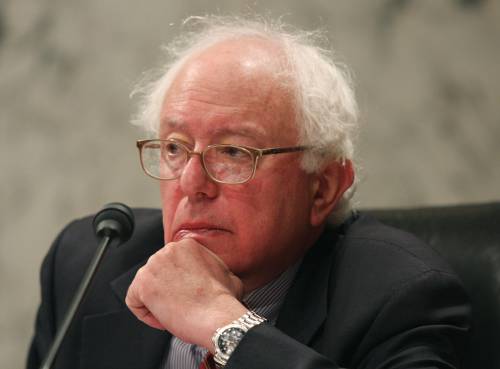 |
| Socialist Bernie Sanders for president? Yes, why not? |
The Democratic Party needs rising stars. It's one of the reasons Hillary Clinton is so far ahead in the race for the Democratic nominee in 2016: There simply are no other first-tier candidates. Enter Bernie Sanders.
I've never heard Senator Sanders utter a policy position that I disagreed with, but then I'm a fellow socialist. What does that mean, exactly? Currently the average American might think it means Bernie's a pinko whack job or at best a man who likes his politics European. Hell, his ideas might be French, for Pete's sake.
Not so. Scratch Bernie Sanders, and he bleeds popular American ideas. Jay Ackroyd spells it out in a guest post at a favorite political blog of mine, Hullabaloo:
[...] I really feel like we have an opportunity here. Not an opportunity to make Clinton say things she’d rather not say. Not an opportunity to raise a big huzzah because, finally, we have a candidate from the Democratic wing of the Democratic party.That line irked me, "We don't hear about it because the gatekeepers—the centrist media and the campaign funders--don’t want these issues on the table." Doesn't it irk you? It should because it speaks to a reality we've seen growing for some time now.
What Sanders offers is the opportunity to change a narrative that has been beating on us for at least the last fifteen years—a narrative that excludes good, popular public policy from consideration. Raising the minimum wage to where it was in the 70s, adjusted for inflation, is good, popular public policy. Recognizing that the 401K experiment for replacing pensions has failed, and we need to increase social security benefits to make up for that failure is good, popular public policy. Making it possible for a student to graduate from college without a crushing debt burden is good, popular public policy. So is the adoption of trade and industrial policies that benefit everyone, not just the rentiers.
This stuff polls well. Really well. In the 70s, even the 80s. We don’t hear about it because the gatekeepers—the centrist media and the campaign funders--don’t want these issues on the table. These are unifying issues. How do you think 50 something white men in West Virginia feel about medical coverage in the years between the corporate job with health benefits and Medicare? How do you think they feel about their retirement security?
I used to love to watch Washington Week every Friday night because the guest journalists -- mostly good, solid liberal journalists who dominated the intellectual policy discussion in Washington -- were featured. It was a more open-ended discussion. Now it's become a Beltway echo-chamber production. Now it's more of an insider's "oh that's never gonna happen in today's DC, yuk yuk ha ha wink wink nudge nudge!" It's the same on This Week or in the pages of Politico.
Which is why Bernie Sanders is good for the 2016 policy debate. Again, what does Jay Ackroyd highlight in Sanders' policy bag?
- Raise the minimum wage to what it was in the 70s, adjusted for inflation.
- Admit the 401(k) is a failure as a replacement for defined benefit pension packages -- that aren't coming back, by the way.
- Offer an expanded Social Security to recover some retirement security for millions of Americans.
- Find a way to provide health care to the economically dispossessed.
- Make public education affordable to drive down or eliminate massive student debt (debt I barely acquired in my own college days).
Can Martin O'Malley embrace this? Can Jim Webb? Can they get into the arena with Bernie and Hillary and talk it up? I hope so, even if it only makes Hillary Clinton a better candidate with better ideas. Democratic Party ideas, for heaven's sake.
Bernie, welcome to the show.

No comments:
Post a Comment